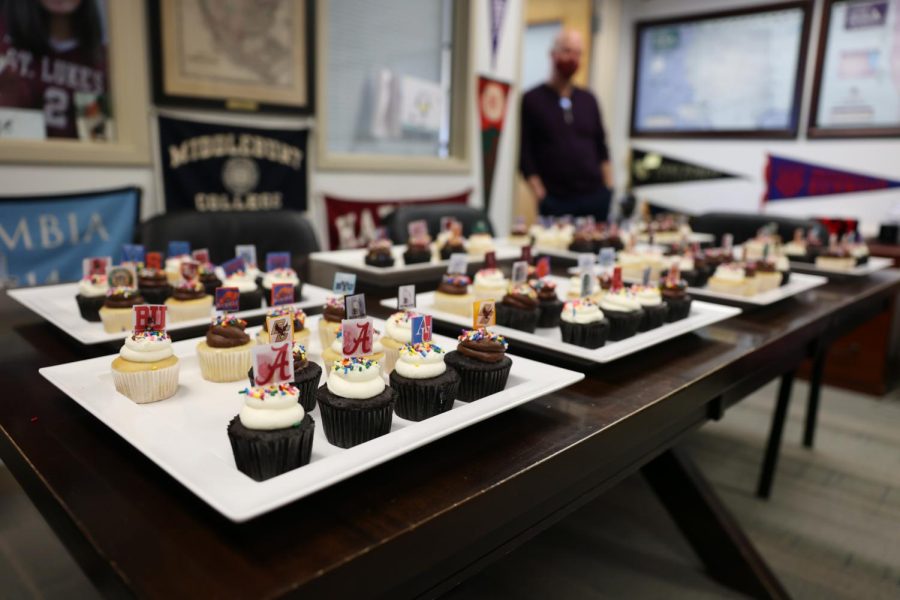The College Process Part Two: The Admissions Perspective
May 19, 2023
After speaking to the SLS college counselors, Ms. Bell and Ms. Veneruso, we struck up an interest in hearing about the college process from a college admissions officer’s perspective. Through the SLS college counseling office, we got in touch with Sam Prouty, Director of Admissions at Middlebury College. In our zoom conversation, Mr. Prouty provided insight into topics ranging from how students view the college process to what colleges are truly looking for in an applicant.
We know that Middlebury receives over 10,000 applications each year. How do you begin narrowing down your admissions pool?
“We read every word of every application, so there is no initial ‘narrowing down’ round. Obviously, a strong academic profile is a primary factor, but many applicants have impressive grades, course rigor, teacher recommendations, etc.
What makes an applicant jump off the page are the more personal pieces – the essay, teacher comments about who they are in and out of class, the activities and community engagements that fill their time.
And, of course, we’re looking for students who fit Middlebury’s mission and culture and programs well.”
Are there any myths about the college process that cause unnecessary stress for applicants? In other words, what is the biggest mistake you see students make on their application?
“I sense that some students kind of play it safe in their self-presentation, which ends up allowing them to look like others in the pool. Applicants should always find a way to showcase their best selves—the parts of themselves that are most unique and interesting and cool and distinctive.
Another myth, frankly, is that only the tip-top ranked and most famous colleges are the “good” ones. If students like Middlebury or other NESCACs, they should be looking at a number of other smaller liberal arts colleges that might not have the same level of name recognition but are awesome schools nonetheless. If somebody falls in love with schools like Middlebury, Bowdoin, and Williams, that’s great, but you may want to find schools that feel like Middlebury, Bowdoin, and Williams, that you have a better shot of getting into.
Additionally, where you go to school does not equate in a linear way to how “successful” you’ll become.”
From your inside perspective, do you see any flaws in the admissions process?
“I am proud of our process and think it works well. If I see a flaw, it’s in the tremendous pressure that some students (and their families) place on needing the most prestigious or recognized college name on the back window of the family car.
There are 4,000 colleges in the US; why do folks focus on only 25 of them? People attach themselves to the 30 or 40 most fancy names, and it’s like all the other colleges don’t even exist.”
What strategies do you suggest for underclassmen as they begin to think about college?
“The college process is not about the college, it’s about you. So, ask yourself hard and probing questions about who you are now and who you are in the process of becoming. Find the colleges that match what you seek academically, professionally, extracurricularly, and culturally.
Be your authentic self. If you spend most of your time writing an application worrying about what you think I want to read, then you’re doing it all wrong. We genuinely just want to get to know you, and who you are, and what makes you tick, how you navigate the world, and who you’re gonna be when you get here. Don’t spend all your time trying to twist yourself into the person you think the college wants – that’s not what we want.
In life, we go out of our way to not stand out too much, and I think we have to get over that. When I read 13,000 applications and I am going to admit a class of 700 students, I actually don’t want to see how you’re like everybody else.
Furthermore, be open to the idea that there is a magnificent school for you that you or your family have never heard of.”
What is something people think they need to do to get into their top school that is incorrect?
“Many students try to be impressive, either by writing in a voice that is over-edited and over-thesaurused or by polishing a resume to the point that it’s 7 pages long (no teenager needs a resume that’s more than 2 sides of one page). The more that students can be true to their own selves and can present themselves in an authentic voice that we can connect with, the more they will emerge as distinctive within the pool.”
We also spoke to Mr Prouty about the college essay, which is often seen as one of the most daunting parts of the application. Mr. Prouty implores students to focus on content and craft in essays. To help SLS students find a creative topic, he shared two different essays about a seemingly irrelevant experience – learning to tie one’s shoes.
The first hypothetical essay was formatted in a strictly (event/fact based) manner, focusing solely on the practice of tying one’s shoes, which is an essay without interesting or beautiful content and craft.
The second hypothetical essay focused on the teachable moments that come from learning to tie one’s shoes, or the connection made between you and younger sibling when the time came to teach them how to tie their own shoes.
In essence, Mr. Prouty wants you to craft a narrative, so don’t be afraid of picking a seemingly small topic if you can make it part of an original story about yourself. He tells us not to “sweat the topic, it’s what [he] learns about you through that topic that matters.”
From our conversations with college experts at both St. Luke’s and Middlebury College, an overarching theme of the process seems to be defining your sense of individuality and discovering what makes you special. Students who stay organized, calm, and true to themselves are sure to find success throughout the process.





Sam Prouty • Jun 14, 2023 at 11:01 am
Nice job on this article! It was a pleasure to speak with you both.